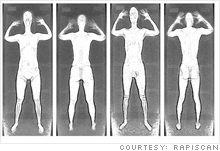NEW YORK (CNNMoney.com) -- The U.S. government is using $25 million in stimulus money to buy and install full body scanners in airports this year, in an effort to ramp up security and create jobs.
The Transportation Security Administration is using funds from the American Recovery and Reinvestment Act to purchase 150 of the full body scanners, according to TSA spokeswoman Sarah Horowitz.
 |
| Rapiscan uses low-dose X-rays to scan airline passengers for weapons and explosives. |
These "backscatter" scanners, which use X-rays to provide detailed images of hidden objects in or under a person's clothing, are manufactured by Rapiscan, a subsidiary of Hawthorn, Calif.-based OSI (OSIS). The scanners cost from $150,000 to $180,000 apiece, according to the company.
Peter Kant, vice president of global government affairs for Rapiscan, said his company received a $25 million contract from the TSA to produce the 150 backscatter scanners. The contract has helped create 25 jobs, mostly manufacturing positions in the company's Ocean Springs, Miss. facility, as well as some engineering jobs, he said.
Kant said the U.S. government has given the TSA the green light to spend $173 million on scanners, which includes the initial $25 million contract.
"Should we get additional orders, we will have to hire additional manufacturing positions," he said in an e-mail to CNNMoney.com.
Horowitz would not specify how much money had been earmarked for TSA spending on scanners, but she said the agency has enough funds that would come from the stimulus program and other federal sources to buy an additional 300 scanners.
The backscatter scanners will be used in airports around the country, but the TSA would not say where. One-third of the backscatter scanners have already been delivered, said Kant.
These scanners are used to detect "anything hidden on the body that is not the body" including metal, plastic, glass and liquids, said Kant, while using X-ray doses that are too low to harm the person being scanned.
"You would get more radiation from the first few minutes of your flight, just from the sun," he said.
Kant said this technology could be effective in detecting explosives, such as those that were allegedly hidden in the underwear of a terrorism suspect on a Christmas Eve flight from Amsterdam to Detroit.
If Rapiscan's scanners had been in place, according to Kant, the incident could have been averted. "We do believe, from what we know from published reports, that we would have detected it," he said.
The TSA has already implemented 40 scanners using a different type of technology called "millimeter wave advanced imaging" in 19 airports servicing Los Angeles, Washington, D.C., Atlanta, Miami, Detroit, Dallas and other cities. These scanners were manufactured by Woburn, Mass.-based L-3 Communications Corp. (LLL, Fortune 500) ![]()






| Index | Last | Change | % Change |
|---|---|---|---|
| Dow | 32,627.97 | -234.33 | -0.71% |
| Nasdaq | 13,215.24 | 99.07 | 0.76% |
| S&P 500 | 3,913.10 | -2.36 | -0.06% |
| Treasuries | 1.73 | 0.00 | 0.12% |
| Company | Price | Change | % Change |
|---|---|---|---|
| Ford Motor Co | 8.29 | 0.05 | 0.61% |
| Advanced Micro Devic... | 54.59 | 0.70 | 1.30% |
| Cisco Systems Inc | 47.49 | -2.44 | -4.89% |
| General Electric Co | 13.00 | -0.16 | -1.22% |
| Kraft Heinz Co | 27.84 | -2.20 | -7.32% |
|
Bankrupt toy retailer tells bankruptcy court it is looking at possibly reviving the Toys 'R' Us and Babies 'R' Us brands. More |
Land O'Lakes CEO Beth Ford charts her career path, from her first job to becoming the first openly gay CEO at a Fortune 500 company in an interview with CNN's Boss Files. More |
Honda and General Motors are creating a new generation of fully autonomous vehicles. More |
In 1998, Ntsiki Biyela won a scholarship to study wine making. Now she's about to launch her own brand. More |
Whether you hedge inflation or look for a return that outpaces inflation, here's how to prepare. More |